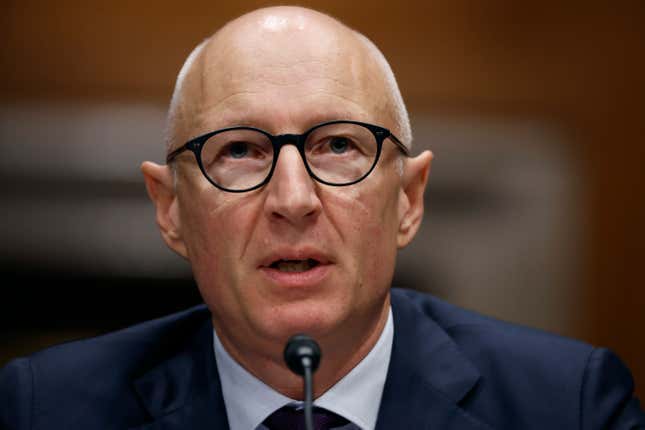
In This Story
Novo Nordisk (NVO+1.61%) CEO Lars Fruergaard Jørgensen will step down after eight years at the helm of the Danish pharmaceutical giant responsible for the blockbuster drugs Ozempic and Wegovy, the company said Friday.
The move comes after Novo Nordisk’s share price fell 50% over the last 12 months, and amid growing pressure from the powerful Novo Nordisk Foundation, which controls the company’s voting majority.
Jørgensen, who joined Novo in 1991 and became CEO in 2017, will stay on for a transition period, the company said. A search for his successor is underway.
“Novo Nordisk’s strategy remains unchanged, and the Board is confident in the company’s current business plans and its ability to execute on the plans,” Helge Lund, the Novo’s board chair, said in a statement.
“Serving as Novo Nordisk’s CEO for the past eight years has been a privilege and an experience that I will always cherish,” Jørgensen said.
Novo Nordisk stock was down about 3% in Friday morning trading after the announcement.
Novo Nordisk’s brief era as ‘Europe’s most valuable company’ era
During his tenure, Novo Nordisk became Europe’s most valuable company — at one point surpassing LVMH — thanks to skyrocketing sales of semaglutide, the active ingredient in Ozempic (for type 2 diabetes) and Wegovy (for weight loss). Both belong to the GLP-1 class of drugs, which regulate blood sugar and suppress appetite.
For a stretch, the growth was nothing short of eye-popping. Since its 2017 debut, Ozempic alone grew into a $13 billion-a-year drug, while Wegovy, which was approved in 2021, became a $4.5 billion blockbuster in just two years. Together, Novo’s GLP-1 therapies helped drive one of the fastest commercial expansions in pharmaceutical history, transforming the company from a niche diabetes firm into a global superpower. Demand was so intense that Novo was forced to pause its advertising in 2023 because of supply shortages.
At the height of the craze, Jørgensen told Bloomberg that he was fielding calls from food company CEOs, so scared were they by the weight-reducing possibility of the new drugs. Hollywood gossip and everyday cocktail party chatter became dominated by speculation about who’s on Ozempic and who’s trying to track down their own supply.
Novo’s oral version, Rybelsus, became another effective addition to its portfolio, while legacy insulin brands like NovoLog and Tresiba helped the company maintain its dominance in diabetes care.
A downturn in fortunes for the Danish drugs giant
But Novo Nordisk’s fortunes have notably shifted over the past year. Shares fell about 50% over the last year amid mounting competition from Eli Lilly (LLY+0.74%), underwhelming trial results for next-gen therapy CagriSema, and growing investor skepticism about just how big the GLP-1 market can get. Wall Street’s initial burst of enthusiasm regarding weight-loss drugs has cooled off considerably. Novo’s Q1 report, which was released on May 7 and lowered growth expectations on “lower-than-planned penetration of branded GLP-1 treatments in the US,” failed to reverse the trend.
Likewise, Friday’s announcement seems only to have further spooked markets. Novo shares fell around 5% in Copenhagen trading, with its U.S.-listed shares also on the decline. Eli Lilly stock, for its part, rose 1.3%.
The Novo Nordisk Foundation also signaled a desire for more control going forward. Foundation chair and former CEO Lars Rebien Sørensen will begin attending board meetings immediately, with plans for formal election in 2026.